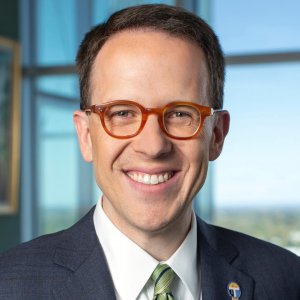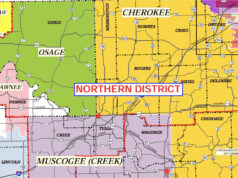
Tulsa Mayor G.T. Bynum managed to fend off a crowded field of challengers in a mayoral race that has drawn national attention, winning 51.9 percent of the vote and avoiding a runoff in November.

Approximately 71,000 voted in the mayoral election, compared to the approximately 59,000 ballots cast in 2016, when Bynum won the office, handily beating incumbent Dewey Bartlett.
This year, however, he has attracted criticism from both sides of the political aisle: for what he later called “dumb, overly simplistic” comments on the police shooting death of Terence Crutcher, for allowing President Donald Trump to hold a rally in the city in the midst of the COVID-19 pandemic, and for instituting a mask mandate.
His main challenger was Greg Robinson, a community organizer finished second with 28.8 percent of the vote. (In third place was Ken Reddick, with 13.8 percent.) Robinson’s senior advisor was Tiffany Crutcher, Terence Crutcher’s sister, and his platform included calls for equitable access to housing and education, improved and “reimagined” public safety and reparations for families affected by the 1921 Tulsa Race Massacre.
Tulsa runs a nonpartisan mayoral election, meaning the candidates all face one another without party primaries. If Bynum had not secured at least 50 percent of the vote, he would have had to face a runoff in the general election on Nov. 3.
Tulsa-area House races decide GOP nominees
In House District 71, Mike Masters has won the Republican nomination after falling just a hair short of avoiding a runoff after the June 30 primary, in which he took home 49 percent of the vote.
Tuesday, he walked away with 62 percent, beating opponent Beverly Atteberry, who was just 117 votes behind him in the June 30 primary.
Masters is a history and government teacher who decided to run for office after participating in the 2018 teacher walkout.
“Running for office has always been something I’d wanted to do. I didn’t serve in the military when I was younger. I kinda got married at a young age,” Masters previously told NonDoc. “I had some guilt about having not served my country that way, and I’m just a very patriotic person and wanted to serve in some shape, way, form or fashion.”
Masters will face the incumbent Rep. Denise Brewer (D-Tulsa) in the general election Nov. 3. Brewer came into office in 2018, flipping the seat for the Democrats after it was vacated by Republican Rep. Katie Henke, who had held it since 2012.
In House District 79’s GOP runoff, bacteriologist Margie Alfonso prevailed with 59 percent of the vote, comfortably ahead of her opponent, Marine Corps veteran Clay Iiams.
Iiams had finished first in the June 30 primary but was dogged by challenges to his candidacy, with his opponents arguing that he missed the party registration deadline and should be disqualified. But no challenge was filed in the contest of candidacy window, as as the Supreme Court refused to assume initial jurisdiction, his candidacy was allowed to stand.
Alfonso will face incumbent Democrat Rep. Melissa Provenzano (D-Tulsa) in the Nov. 3 general election. Provenzano, a former teacher, came into office in 2018, flipping the seat for the Democrats.
Voters pass five amendments to city charter
Voters also approved five proposed amendments to the Tulsa City Charter, all by comfortable margins.
The first and second amendments remove references to partisan primary elections (which Tulsa did away with in 2011) and gendered language from the charter.
The third proposition allows the mayor and city council to institute rules and mechanisms to remove appointed members of city boards, commissions and other bodies. There was previously no way to remove appointees before the end of their term, including for misconduct.
The fourth and fifth amendments, respectively, give the city council a role in selecting the city attorney — a choice that previously belonged solely to the mayor — and specify that the city attorney will assist and advise the city auditor and the city council, in addition to the mayor.
The fifth proposition also clarifies that though the charter says the city attorney will “approve as to form and legality all ordinances and resolutions adopted by the Council or state in writing the reasons for not approving,” the absence of approval does not function as a veto.
(Correction: This article was updated at 1:35 a.m. Wednesday, Aug. 26, to note that Margie Alfonso won the HD 79 GOP primary. NonDoc regrets the error.)





















